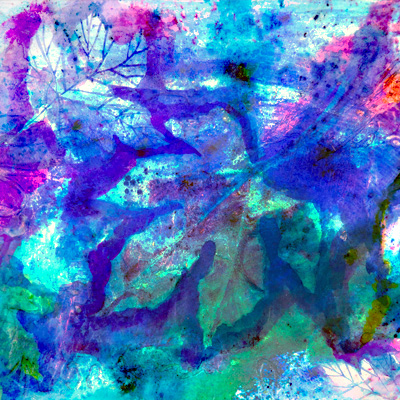Case Study: The Queen's Green Canopy, a nature-themed abstract painting and creative writing project
Authors(s), Creator(s) and Contributors: Marion Cheung, Visual Artist, Arting Wales
Publication Date: 22/07/2023
Categories: Case Studies
Partner(s): Mental Health Matters (MHM Wales), Cardiff and Vale UHB, Arting Wales (Marion Cheung)
Funder(s): Cardiff and Vale Arts Team and Health Charity
Introduction
Between April - June 2022, artist Marion Cheung delivered 8 mixed media sessions, of painting, drawing, and digital crafts online and in person. Building upon 'Threads of Memory, The Spaces Between Us' (2021), the project extended mixed media and sensory activities to a dementia ward, involving patients and MHM staff. Using all our senses in reminiscence and art aids patients in recalling memories. Abstract art was explored to enhance dementia patients' visual creativity and engagement with staff. The goal was to transform their art into digital prints to be displayed in the hospital and enable staff to facilitate specialised art and digital craft sessions independently within different hospital venues.
The Challenge
Covid delayed starting the project, resulting in a new staff team to work with. Some patients chose to remain in their rooms, abstaining from activities. The MHM team observed a need for more specialised sensory art and craft engagements. These aimed to trigger memory with reminiscence therapy while encouraging new dayroom activities. Staff aimed to acquire skills in mixed media and digital crafting, enhancing art with touch, sound, and light. The initial 6-week pilot was deemed insufficient for embedding thorough learning of digital craft skills. Would it be possible this time to deliver digital craft teaching in person and not solely online? WB, the Activities Co-ordinator, praised the successful concept, which engaged many patients differently to what had been previously delivered.
The Approach
The session duration was 1.5 hours. It began with 3 in-person staff sessions to build skills before the online workshops with patients. Participants' sense of achievement through artwork creation was crucial, especially in times of stress (Pollanen, 2015), supporting staff well-being. Site visits to St. David's and Heath Hospital explored workshop space and innovative artwork display ideas, considering the hospital's prior use as a Covid facility. Online workshops started with 'failure-free' sensory drawing to minimize self-criticism and encourage a playful approach. In-person sessions with 3 Activities Coordinators followed. Over 8 weeks, 40 patients co-created 20 artworks, with variable weekly attendance (4-9 participants). Sessions were standalone, adaptable for interruptions. The negotiated £2225 budget covered the design and delivery of workshops, production of a creative handbook for staff, and digital artwork created using patient and staff work. It excluded professionally printed artwork by a third party. Initially, staff workshops focused on ink painting and art-viewing skills. Staff sparked meaningful conversations with patients using art as catalysts. Patients generated ideas for their mixed media pieces.
The Impact
“A few weeks ago, JC wouldn't get out of bed. It's so nice to see him in here, talking with the other patients” - GM Through these workshops, staff members honed their ink painting abilities and gained valuable experience in using art as a means of fostering communication and expression among patients. This initiative aimed to create a more interactive and therapeutic environment within the hospital setting. “The conversations we had with patients generated deeper meanings – not usually reached in day to day activities” - GM Evaluation through observations and reviews showed: Improved patient connections, and engagement even with non-participants, before and after the sessions. Abstract art, and sensory innovation sparked deeper, imaginative conversations. Staff gained skills, and successfully led sessions independently at The Heath. Tactile materials positively affected patients. Delivering online sessions offered novelty and many patients wanted to take part. Staff honed their ink painting and craft skills, fostering communication through art. "Conversations reached deeper meanings." Patients moods were notably elevated during and after the sessions. Staff learnt skills that could be applied at home, with their families.
Lessons Learned
Despite the delayed start, I utilised the time to refine techniques by testing on a separate group before launching in April 2022. This improved patient accessibility. For future projects with dementia patients, I will omit digital elements due to safety concerns and time constraints on staff. Freelance support might mitigate this. The painting workshops, using sensory materials, successfully blended creative writing, fostering deep conversations. Integrating writing also introduced new expressive avenues.
The Legacy
Further sessions are being discussed with MHM Wales for a new phase at Llandough Hospital, depending on funding. Partnering with Occupational Therapists and dementia staff is key to strengthening artist-healthcare ties, benefiting patients through shared learning. Transforming patient art into digital prints for ward display would be inspirational. Sustaining the project involves ongoing artist collaboration. Staff noted positive patient responses, creating an inclusive ward exhibition that uplifts both patients and the environment.
Website and Social Media Links
https://www.arting.wales/projects-1/the-queens-green-canopy-ii https://www.arting.wales https://twitter.com/MarionCheung https://www.instagram.com/artings_and_inklings/ https://www.facebook.com/MarionCheung
Contact Details
Marion Cheung: hello@arting.wales melanie.wotton@wales.nhs.uk gabriel.mandal@mhmwales.org
Tags: Mental health, staff and patient well-being, dementia, mixed media art, painting, creative writing, experimental art, sensory art, nature-themed, nature, digital arts, digital crafts

